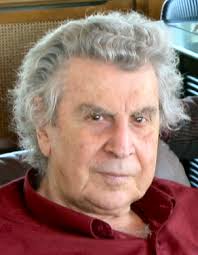Also known as:
Michael Theodorakis, Μίκης Θεοδωράκης
More People of Greece
More Topic Categories
Related Destinations
Mikis Theodorakis (29/07/1925 - )
 Mikis Theodorakis is one of the most important Modern Greek composers.
Mikis Theodorakis is one of the most important Modern Greek composers.He was born in 1925 in Chios. Because of his father’s work as a civil servant, the family moved frequently; therefore, Theodorakis spent his childhood in various places in Greece, such as Lesvos, Ioannina, Kephalonia, and Tripoli. When he was 17 years old, he had his first concert in Tripoli, performing his own work Kassiani. He also participated in the resistance against the German forces. During the protest of 25 March 1943, he was arrested and tortured by the Italians. He escaped and went to Athens, while at the same time, he started studying at the Conservatory of Athens. After the liberation of Greece, the Civil War broke out, and Theodorakis was chased by the authorities due to his liberal ideas. He was eventually arrested and sent to exile to Ikaria and Makronisos.
In 1950, he completed his studies and received his degree in harmony. In 1954, he went to Paris to study at the Conservatoire on a scholarship. In the following years, he wrote music for the ballets of Ludmila Tcherina, Covent Garden and Stuttgart, as well as for movies. In 1957, he received the Grand Prize of the Moscow Festival. In 1960, he returned to Greece; having composed music for the poem Epitaph by Yannis Ritsos, he made a turn to folk songs, which spoke at the hearts of the Greeks. In 1964, he became known worldwide for composing music for the movie Zorba the Greek by Michalis Kakoyiannis.
During the Regime of the Colonels, he cofounded the first resistance organization against the dictatorship. He was arrested later that year and started a hunger strike. He was afterwards admitted to hospital, set free, forced to home arrest, and finally getting arrested again. Throughout this period, he composed music, and even managed to send some of these pieces abroad, so they were sung by Mercouri and Farantouri. However, during his last arrest, his health quickly deteriorated; there were international protests by Shostakovich, Miller, Olivier and others, thus forcing the regime to set him free.
In 1970, he went to Paris and later started touring all over the world, organizing anti-dictatorship concerts, meeting with prime ministers and asking for the restoration of Democracy in Greece. In 1972, he visited Israel and became an informal intermediary between the Israeli government and Yasser Arafat. In the years that followed, Theodorakis played this part many times; in fact, in 1994, at the celebration of the signing of an agreement between Israel and Palestine, one of Theodorakis’ songs were introduced to the audience, honouring him for his help on this matter.
After the fall of the dictatorship, he returned to Greece and performed on various concerts. In 1983, he received the Lenin Award for Peace. He also started being involved in politics, and also became member of the parliament during the periods 1981 – 1986 and 1989 – 1992.
See Also:
 Athens Photos
Athens Photos
 Santorini Photos
Santorini Photos
 Crete Photos
Crete Photos
 Meteora Photos
Meteora Photos
 Corfu Photos
Corfu Photos






